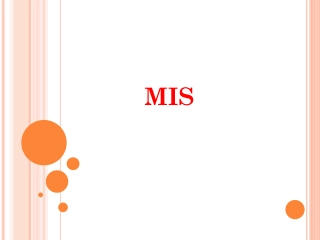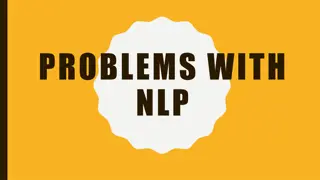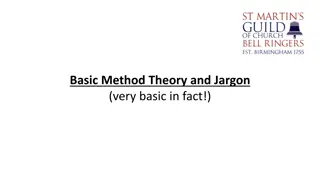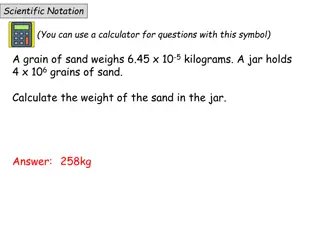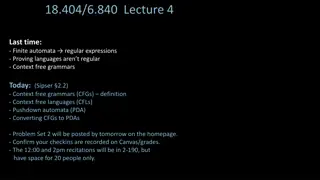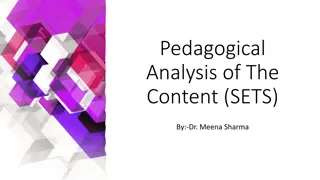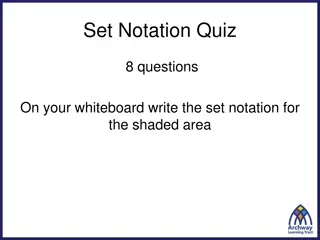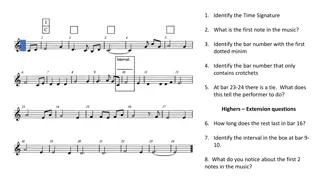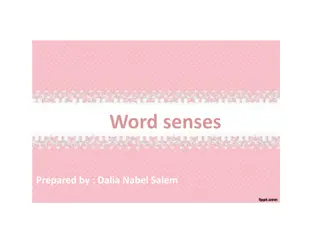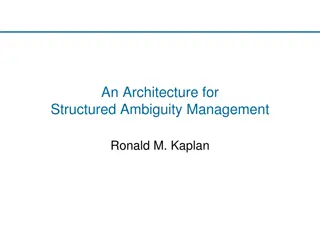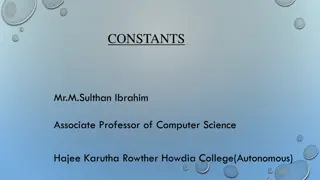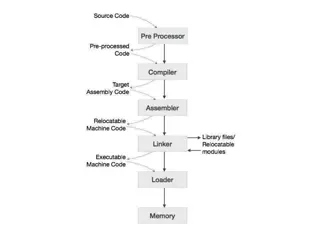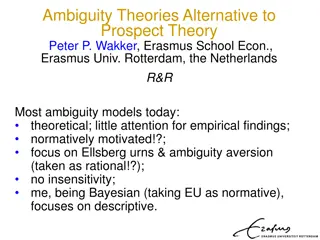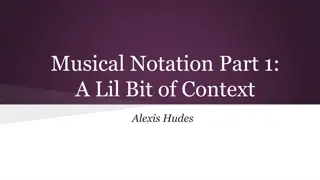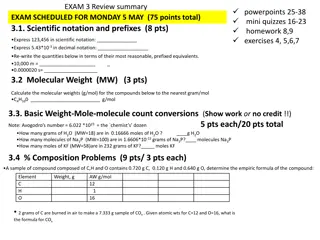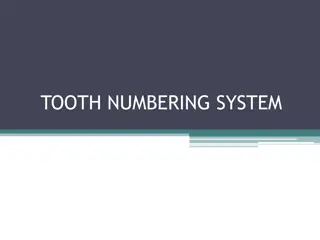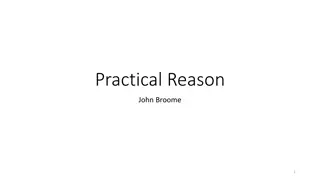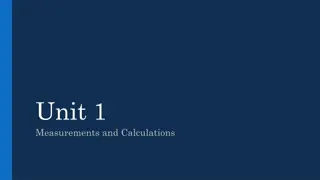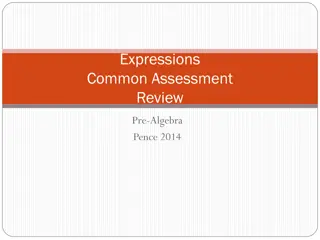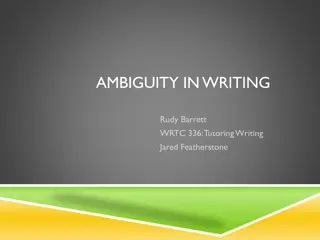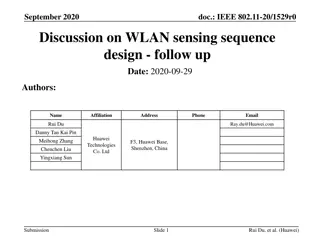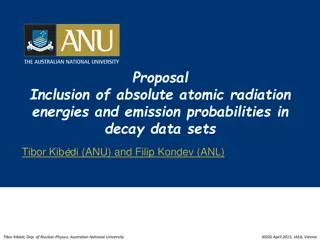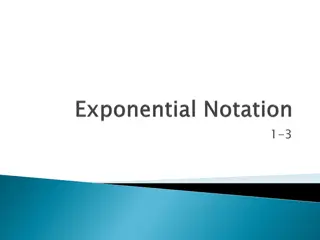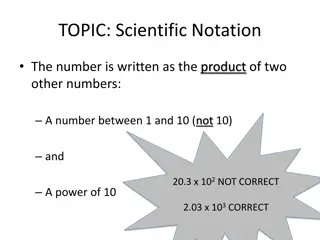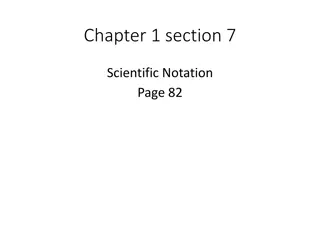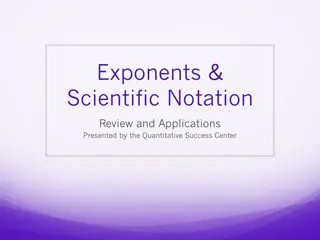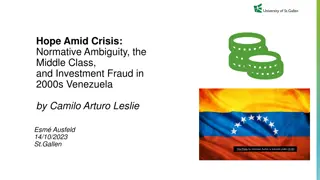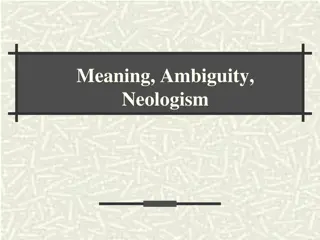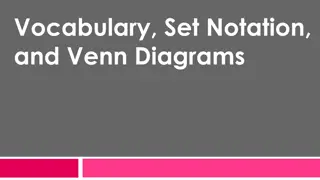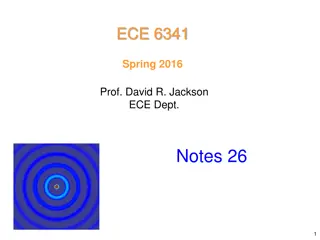Understanding Management Information Systems (MIS) in Business Organizations
Explore the world of Management Information Systems (MIS) in business settings, covering topics such as sales, supplier management, purchase orders, forecasting, stock details, customer orders, dispatch instructions, financial transactions, and more. Gain insights into the role of MIS in bringing or
2 views • 38 slides
Understanding Ambiguity in Natural Language Processing (NLP)
Natural Language Processing (NLP) faces challenges with ambiguity, which occurs due to multiple possible interpretations of language input. Humans can often resolve ambiguity, but it's complex for computers. Types of ambiguities include lexical, syntactic, pragmatic, referential, and transient. Over
2 views • 24 slides
Understanding Ambiguity in English Language
Exploring the concept of ambiguity in the English language, this article delves into the various meanings words can convey, the challenges of ambiguity resolution, and the types of ambiguity such as lexical and structural ambiguity. Examples of homonymy and homophony are provided to illustrate how w
2 views • 27 slides
Introduction to Basic Music Theory Concepts and Notation
Delve into the fundamental elements of music theory, exploring notation, scales, and chord progressions through visual representations. Learn how to read and interpret musical symbols, paving the way for a deeper understanding of music composition.
2 views • 13 slides
Mathematics Practice Problems - Fractions, Percentages, Scientific Notation, and Expanding Brackets
Practice various mathematics topics such as fractions, percentages, scientific notation, and expanding brackets with sample problems and solutions.
0 views • 66 slides
Understanding Context-Free Grammars (CFGs) and Pushdown Automata
Exploring Context-Free Grammars (CFGs) and Pushdown Automata, covering definitions, examples, ambiguity, and conversions. Learn about generating strings, CFG formal definitions, ambiguity in grammars, and more. Connect with the basics of context-free languages and their relations to PDAs. Dive into
0 views • 13 slides
Pedagogical Analysis of Sets in Mathematics: Key Concepts and Teaching Strategies
Explore the pedagogical analysis of SETS by Dr. Meena Sharma, focusing on major concepts like the meaning of SET, SET notation, classification of SETS, and fundamental operations. Understand minor topics such as examples of sets, SET notation methods, and types of SETS. Objectives include defining S
0 views • 8 slides
Understanding Enemark-Feltham Notation in Iron-Nitrosyl Complexes
Iron-Nitrosyl complexes are redox non-innocent, with NO exhibiting multiple redox states. Enemark-Feltham Notation helps in determining metal-ligand interactions and oxidation states. Detailed information on NO ligands, bonding characteristics, and methods for analyzing iron-NO systems are discussed
0 views • 6 slides
Math Set Notations and Probability Practice
Practice set notation and probability with quizzes on set notation, Venn diagrams, and probability calculations based on survey results. Improve your math skills through visual exercises and calculations.
0 views • 19 slides
Understanding IP Addressing and Conversion from Binary to Decimal
Learn about IP addressing, including binary notation, dotted-decimal notation, and the process of converting binary numbers to decimal. Explore the unique features of IP addresses and the steps involved in converting binary to decimal systematically.
3 views • 47 slides
Music Notation Analysis Questions and Answers
This content provides a series of music notation analysis questions with corresponding images for practice and learning purposes. The questions cover topics such as identifying time signatures, notes, rests, intervals, keys, and specific bars with certain musical elements like ties, dotted minim, cr
0 views • 12 slides
Understanding Polysemy and Homonymy in Lexical Ambiguity
In lexical ambiguity, polysemy refers to one word having multiple related senses, while homonymy involves different words that sound the same but have unrelated meanings. Distinguishing between polysemy and homonymy can be challenging, but certain guidelines can help differentiate them based on shar
0 views • 27 slides
Managing Ambiguity in Language: An Innovative Approach
Language presents challenges due to its inherent ambiguity, making it difficult to map between form and meaning. This content discusses an architecture for structured ambiguity management, emphasizing the complexities of linguistic interpretation, modular mapping from text to meaning, and the pervas
0 views • 31 slides
Understanding Different Types of Constants in Programming
Constants in programming are fixed values that do not change during program execution. They include character, numerical, and string constants. Integer constants can be decimal, octal, or hexadecimal. This article explains each type of constant with examples of decimal, octal, and hexadecimal intege
0 views • 22 slides
Understanding Issues in Context-Free Grammar: Ambiguity, Precedence, Associativity, and More
Delve into the complexities of context-free grammar, exploring concepts such as ambiguity, precedence, associativity, left recursion, and left factoring. Learn about the challenges posed by left recursion and the differences between ambiguous and unambiguous, as well as deterministic and non-determi
0 views • 7 slides
Explore the Benefits of Music Notation Software for Educators and Students
Discover the advantages of using music notation software in education, from enhancing creativity and exploration to facilitating composition and arrangement tasks. Learn about popular programs like Musescore, Sibelius, and GarageBand, and empower students to write music for various genres and purpos
0 views • 11 slides
Ambiguity Theories as Alternatives to Prospect Theory
This article explores ambiguity theories as alternatives to Prospect Theory, focusing on decision-making under uncertainty. It discusses the Anscombe-Aumann framework, multiple priors models, and applications of ambiguity models. The popular Anscombe-Aumann framework is detailed, with a two-stage ap
0 views • 29 slides
Evolution of Musical Notation Systems and Contexts
Explore the diverse world of musical notation systems, from Eastern to Western traditions, spanning Babylonian notations, Guido d'Arezzo's contributions, Gregorian chants, and modern-day tempo measures. Uncover the rich history and nuances of musical expression through various scales, staves, orname
0 views • 12 slides
Chemistry Exam Review: Topics in Scientific Notation, Molecular Weight, Stoichiometry, and Limiting Yield
Explore key concepts in chemistry, including scientific notation, molecular weight calculations, reaction balancing, stoichiometry, and limiting yield problems. Prepare for an upcoming exam by practicing various problems and conversions related to these topics, such as expressing numbers in scientif
0 views • 4 slides
Understanding Tooth Numbering Systems in Dentistry
Dental professionals use various tooth numbering systems to identify and record teeth in the mouth. The three main systems are Universal Notation, Zsigmondy/Palmer Notation, and Federation Dentaire Internationale (FDI). Universal Notation utilizes letters for primary teeth and numbers for permanent
0 views • 19 slides
Understanding Big-Oh Notation in Time Complexity Analysis
Big-Oh notation in algorithm analysis signifies how the runtime of an algorithm grows in relation to the input size. It abstractly characterizes the worst-case time complexity, disregarding constants and lower-order terms. The concept of Big-Oh, along with Big-Omega and Big-Theta, helps in comparing
0 views • 18 slides
The Complex Themes of Vulnerability and Ambiguity in Statius's Achilleid
Exploring the intricate narrative of Statius's Achilleid, this analysis delves into the vulnerability of Achilles and Thetis's attempts to mitigate it, challenging the traditional epic genre through hybridity and ambiguity. The thematic interplay of divine-human dynamics, gender ambiguity, and the c
0 views • 14 slides
Exploring the Ambiguity of Reason in Philosophy Through Historical Perspectives
The ambiguity and complexity surrounding the concept of reason are delved into through the historical lenses of John Broome and David Hume. From the early uses of "reason" in English to its normative implications in moral philosophy, this exploration sheds light on the multifaceted nature of reason
0 views • 21 slides
Music Notation and Interpretation in KS3 Curriculum
Explore music notation in KS3 Music curriculum, focusing on reading and writing notes from E up to F on the treble clef. Understand various forms of notation such as graphic scores and enhance your musical literacy skills throughout the academic year.
0 views • 89 slides
Understanding Scientific Notation and SI Measurement Basics
Explore scientific notation as a method for expressing large and small numbers efficiently in mathematical calculations. Practice converting numbers into scientific notation and learn the rules for multiplication, division, addition, and subtraction in this format. Additionally, discover the benefit
0 views • 41 slides
Pre-Algebra Review: Expressions and Exponents
This pre-algebra review covers topics such as evaluating expressions, working with exponents, using scientific notation, and standard form notation. Examples and answers help reinforce understanding of fundamental algebraic concepts.
0 views • 29 slides
Understanding Ambiguity in Writing: Types and Examples
Explore the different types of ambiguity in writing, including lexical, syntactic, and structural ambiguity. Learn how awkward wording, dangling modifiers, and crash blossoms can lead to confusion in writing. Discover ways to identify and address ambiguity in your own writing to improve clarity and
0 views • 15 slides
Understanding Scientific Notation in Mathematics and Chemistry
Scientific notation is an essential concept for representing very large or very small numbers efficiently. It simplifies numbers by expressing them as a coefficient multiplied by a power of 10. This summary covers the basics of scientific notation, from converting numbers to and from scientific nota
0 views • 55 slides
Understanding Molar Mass and Avogadro's Number in Chemistry
Explore the concept of molar mass and Avogadro's number in chemistry through lessons on translating numbers into scientific notation, understanding moles, and finding molar mass on the periodic table. Discuss the relationship between mass and moles, differentiate between different quantities of a su
1 views • 11 slides
Analysis of WLAN Sensing Sequence Design Using Ambiguity Function and Range-Doppler Map
In this document, the authors from Huawei discuss the analysis of employing the ambiguity function for WLAN sensing sequence design. They delve into the ambiguity function's definition, analysis, and its comparison with the range-Doppler map. The document highlights the importance of ambiguity funct
0 views • 15 slides
Integration of Atomic Radiation Energies and Emission Probabilities in Decay Data Sets
Proposal by Tibor Kibdi and Filip Kondev to include absolute atomic radiation energies and emission probabilities in decay data sets. They emphasize the need for energy and intensity data to be computer-readable and use standard notation. The inclusion of atomic relaxation data into ENSDF is discuss
0 views • 7 slides
Understanding Exponents: Simplifying Expressions and Scientific Notation
Explore the concept of exponents, learn how to simplify expressions with negative exponents, and delve into scientific notation for efficiently representing large numbers. Discover the basics of exponents, operations involving exponents, and the application of scientific notation in various discipli
0 views • 8 slides
Understanding Exponential Notation and Evaluating Expressions with Exponents
Learn about the vocabulary related to exponential notation, how to write expressions with exponents, and how to evaluate expressions with exponents both inside and outside parentheses. Practice problems included to enhance understanding.
0 views • 17 slides
Understanding Scientific Notation: Converting, Multiplying, Dividing & More
Scientific notation is a way to express large or small numbers efficiently. Learn how to convert numbers to and from scientific notation, multiply and divide in scientific notation, and ensure proper formatting. Understand the rules for exponents and make calculations easier with these simple steps.
0 views • 8 slides
Understanding Scientific Notation and Conversions
Scientific notation is a useful way to express very large or very small numbers in a concise form. This chapter discusses how to convert numbers between scientific notation and decimal notation, providing examples and explanations for better understanding.
0 views • 18 slides
Understanding Exponents and Scientific Notation
Exponents are powers to which bases are raised, allowing for efficient representation and calculation of numbers. This review covers the basics of exponents, rules, laws, and practical applications. Scientific notation offers a method to express very large or small numbers using powers of 10. Learn
0 views • 13 slides
Hope Amid Crisis: Normative Ambiguity, the Middle Class, and Investment Fraud in 2000s Venezuela
The study delves into the impact of Stanford Financial Group's investment scheme in Venezuela between 1986-2009, particularly on the middle-class Venezuelans. It explores how normative ambiguity affected the financial decisions of middle-class individuals, highlighting the interplay between futurity
0 views • 10 slides
Understanding Ambiguity in Translation Theory
Exploring the complexities of ambiguity in translation theory, this content delves into the nuances of meaning, neologisms, and the challenges faced by translators in deciphering text. It discusses the various types of ambiguity, such as lexical and semantic, highlighting their impact on language in
0 views • 27 slides
Understanding Set Notation and Probability in Visuals
Explore the concepts of vocabulary, set notation, Venn diagrams, probability, experiments, outcomes, sample space, events, unions, intersections, complements, and set notation through visual aids and clear explanations. Learn about subsets, empty sets, and more in this comprehensive resource from Wa
0 views • 24 slides
Understanding EM Plane-Wave Transformation Notes
In these notes by Prof. David R. Jackson for ECE 6341, the concept of EM plane-wave transformation is discussed in detail. It covers topics such as the relationship between Er and Ar, Hr and Fr, field components representation, integration formulas, and notation usage like Harrington notation. The c
0 views • 17 slides
